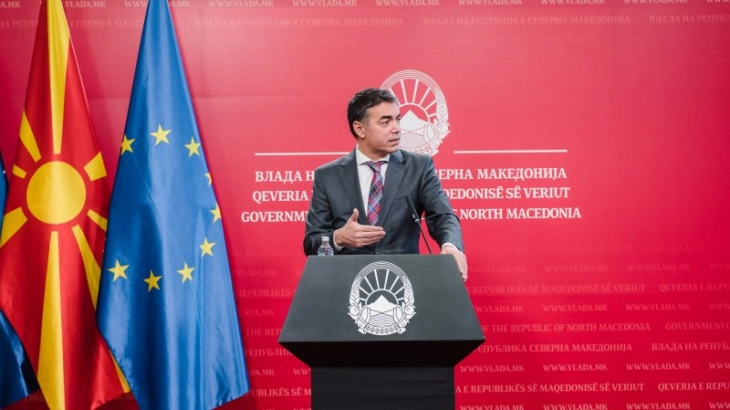Dimitrov: Relationship changed when Bulgaria violated Friendship Treaty

Skopje, 24 September 2021 (MIA) – Our relationship with Bulgaria changed when the country violated Article 2 of the Friendship Treaty, which specifies that Sofia will assist our European path, won’t hinder or block us. Since, we saw two vetoes and issues over our language. No progress can be made with blackmail. There’s need for mutual trust and respect in order achieve progress in dialogue over issues, Deputy PM for European Affairs Nikola Dimitrov said on Friday.
“The point of the Friendship Treaty was for governments, political leaders, to deal with the present and future, leaving history to historian. Politics can create a favorable atmosphere for academics and historians to talk freely. But what happened was - the relationship changed because Bulgaria violated Article 2 of the Friendship Treaty which specifies that Sofia will assist our European path, won’t hinder or block us. Since, we saw two vetoes and issues over our language, the Macedonian language, at European level, which have made honest dialogue difficult. That’s the main issue at the moment, which we’ll continue to try and resolve. The more trust and respect we have for each other and the issues that are important for the other side, the easier it will be to talk about mutually-important issues,” Dimitrov told reporters after signing a memorandum for trilateral project aimed at promoting digitalization in North Macedonia.
He underlined that the progress in talks about history and discussions in other areas are hindered by blackmail.
“In order to be truly close and achieve real progress there can’t be blackmail. There must be mutual respect and greater understanding for the other side. We can’t build friendship and closeness without basic respect and we definitely can’t build it with blackmail,” Dimitrov stressed.
He reiterated that the responsibility of politics is to create a suitable atmosphere for experts and academics to address issues regarding history.
“Currently that atmosphere is disrupted as a result of the two vetoes – a violation of Article 2 of the Friendship Treaty, which specifies that Bulgaria will support and assist us in moving forward towards a joint European future. The quicker we restore a positive atmosphere for overcoming differences and talk, the greater the progress we’ll achieve,” the Deputy PM noted.
In regard to statements issued by the new US Western Balkans Envoy Gabriel Escobar, that there are other ways to resolve the issue, without blocking North Macedonia’s European integration, US Ambassador to North Macedonia Kate Byrnes said that he had reiterated the US’ long-term value policy, that is, support for the country’s EU integration.
“We see North Macedonia’s future in the EU and reiterate the importance of dispute resolution. We continue discussions with partners in Skopje, neighboring countries and across Europe and are doing everything we can to ensure the process moves forward. I can confirm that the US will get involved in talks, because we all share the same vision - for North Macedonia to take its rightful place in EU and Europe as soon as possible,” Byrnes said.
Moreover, she refused to speculate on plans she hasn’t been briefed on.
“The role of the US is clear – we’ve expressed interest and consider North Macedonia, as well as the EU, strategic partners. However, we can’t resolve the issue directly. So, beware of misinformation,” the Ambassador warned.
Prime Minister Zoran Zaev said on Thursday that he expects Bulgaria to continue to be North Macedonia’s friend and supporter in the European integration process in line with Article 2 of the Friendship Treaty, stressing that North Macedonia won’t deliver until it receives support.







